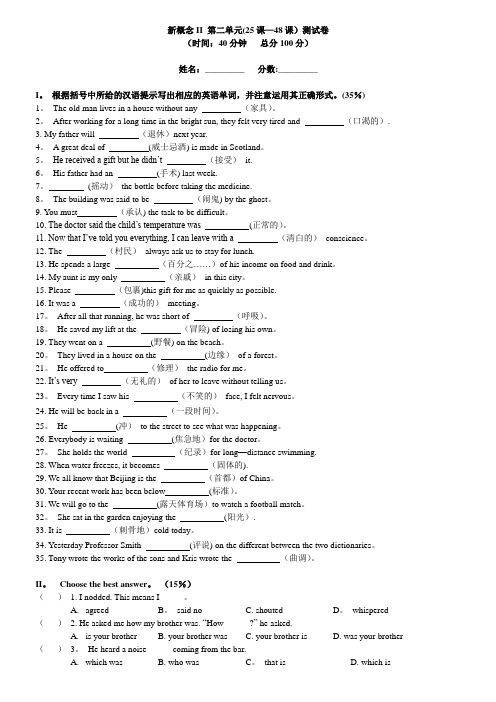新概念二.第25讲.学生版
- 格式:doc
- 大小:426.50 KB
- 文档页数:12



新概念英语第二册lesson25详尽版新概念英语第二册 lesson25 Do the English speak English?标题:English在这里均为名词,但意义不同。
第1个指“英国人”,为总称,后面的动词必须用复数;第2个指“英语”。
指语言时前面不加冠词,指人则要加the:English还可以作形容词,表示“英格兰的”、“英国的”、“英国人的”等;单词:1.★ railway n.rail(铁路)+way(路,途径) rail 扶手,栏杆,围栏railway/train station:火车站 highway 公路 subway 地铁2. ★ several 几个few+可数名词复数 little+不可数名词several+可数名词复数=a number of(一些)several times: I repeated my questions several times.some 一些即可以修饰可数,又可以修饰不可数a grea t number of… 大量的some time 一段时间some time ago 一段时间以前sometime adv. 某时 sometimes adv. 有时, 偶尔3.★ foreigner n. 外国人a blue-eyed foreigner 蓝眼睛外国人foreign adj.①外国的,海外的外国留学生:foreign students洋货:foreign goods外交事务:foreign affairs②陌生的e.g. The subject is foreign to us.4.★ wonder v. 感到奇怪① wonder at sth. 对...事情感奇怪I wonder at the beauty of the old town.② I wonder 想要知道: want to knowI wonder if you have friend.③wonder about sth. 对什么感到怀疑what are you wondering about?你对什么感到疑惑呀?④No wonder that… 难怪…No wonder that he is the top student, he works so hard everyday.wonder n. 奇观Jane is a wonder. She never fails in her examinations.the seven wonders of the world in ancient times 世界古代七大奇观wonderful adj. 极好的e.g.I would be a wonderful wife.练习:1. 我想知道她什么时候能来。



新概念II 第二单元(25课—48课)测试卷(时间:40分钟总分100分)姓名:_________ 分数:_________I。
根据括号中所给的汉语提示写出相应的英语单词,并注意运用其正确形式。
(35%)1。
The old man lives in a house without any (家具)。
2。
After working for a long time in the bright sun, they felt very tired and (口渴的). 3. My father will (退休)next year.4。
A great deal of (威士忌酒) is made in Scotland。
5。
He received a gift but he didn’t (接受)it.6。
His father had an (手术) last week.7。
(摇动)the bottle before taking the medicine.8。
The building was said to be (闹鬼) by the ghost。
9. You must (承认) the task to be difficult。
10. The doctor said the child’s temperature was (正常的)。
11. Now that I’ve told you everything, I can leave with a (清白的)conscience。
12. The (村民)always ask us to stay for lunch.13. He spends a large (百分之……)of his income on food and drink。
14. My aunt is my only (亲戚)in this city。
15. Please (包裹)this gift for me as quickly as possible.16. It was a (成功的)meeting。
造句练习【学生版】Lesson1她的父母想让她上私立学校。
我每周都和朋友去戏院。
我妈妈对考试结果很生气。
我们应该在公共场合注意自己的言行。
他突然转身并说道:“这不管你的事儿。
〞Lesson3我妹妹在圣诞节寄了我一个礼物。
繁重的家庭作业破坏了我的假期。
上周,学生参观了位于市中心的博物馆。
一个外国人教了我几句英语。
他对朋友很友好。
到了最后一天,我做了一个重大决定。
有一个单身女性正坐在花园里。
我每天早上都起很晚。
1.Lesson4打篮球是一项令人兴奋的运动。
我收到一封国外大学的来信。
我想为一家大公司工作。
有很多中国学生正在国外读书。
我刚刚买了一台全新的iphone5。
我的房子位于市中心。
他已经去美国了。
他们很快要去参观那个新的博物馆。
我的爷爷奶奶从来没有出过国。
1.Lesson7我们正期待着好的雅思成绩。
几小时前,他收到一个来自南非的钻石包裹。
一些学生偏爱私立学校而另一些喜欢公立学校。
老师告诉我把书从架子上拿下来。
我带着护照并进入了海关。
在政府门口有两位军人站岗。
令他们惊奇的是,包裹是空的。
她从男朋友那里收到一个钻石戒指。
小偷从乘客包里偷了一些钱。
他失败的主要原因是不耐心。
他们期待一个新的开始。
他几小时前去了机场。
Lesson10这个是由我爷爷买的。
他敲击琴键时用力过猛,所以钢琴坏了。
所有人被消息震惊了。
学生被允许每小时休息一次。
洗车正在修理厂被维修。
这套西服产自意大利。
珠宝被放在保险柜里。
这套房子属于我爸爸。
他们已经在住了很长时间。
他们已经很久没见面了。
Lesson13现在,很多人喜欢去私人俱乐部。
披头士是一个流行歌曲演唱团。
他们已经去全国各地旅行了。
在此期间,大局部学生都得到了目标。
上周六,他们像平常一样进行了表演。
在国庆期间,警察日子不好过,因为他们要维持公共秩序。
每逢这种场合,情况都是这样1.Lesson14暑假我有一次有趣的经历。
一个美丽的女孩向我挥手。
一个陌生人在路上向我提出搭车。
我拒绝向陌生人提供搭车。
课堂内容Do the English Speak English? Array ArrayPart 1 Basic words and expressions 1 arrive (v) 到达Arrive in 后接大地点Arrive at 后接小地点表示到达的词还有reach(及物动词,直接加地点);get to;例:He arrived in Shanghai last Sunday.My brother arrived at the village yesterday.I will reach there in ten minutes.When will you get to school?2 at last 最终;最后相当于finallyAfter some hard work, he passed the exam at last.3 railway n.铁路The railway station was big, black and dark.A new railway is being built.4 the way to…去某地的路I don‟t know the way to the nearest station.5 porter n.搬运工Did you remember to tip the porter? 你记得给搬运工小费了吗?6 not only…but also…的用法用于连接两个表示并列关系的成分,着重强调后者,其意为“不仅……而且……”;其中的also有时可以省略。
如:She not only plays well, but also writes music. 她不仅很会演奏,而且还会作曲。
He works not only on weekdays but on Sundays as well. 他不仅平时工作,星期日也工作。
使用not only … but also … 时须注意的几点:(1). not only与but also后面所连接的词的词性必须对等:Franklin was considered not only an inventor, but also a statesman. 富兰克林不仅被看作发明家,而且被看作政治家。
The nurse was not only competent but also kind. 这位护士不仅能干而且亲切和蔼。
Not only you but also she has to attend the ceremony. 不令你而且她也得参加典礼。
(2). not only只能连用,而but also既可连用,也可分开用:Television is not only boring, but it also wastes a lot of time. 电视不仅乏味,而且还浪费许多时间。
cShe was not only compelled to stay at home, but she was also forbidden to see her friends. 她不仅被强迫蹲在家中,而且被禁止去看朋友。
(3).谓语动词的数应与but also后主语的数保持一致:Not only you but also Mr. Zhang teaches in this college. 不仅你,张老师也在此学院教书。
除了not only…but also 之外,可用于就近原则的还有neither…nor/either…or/there be句型(4). not only放在句首,后接句子时要用倒装结构:Not only does television appeal to those who can read but to those who can't. 电视不仅吸引阅读的人,而且也吸引了不会阅读的人。
7 as well 也,还,是副词短语,其义为“也”,相当于too,它一般放在句末,有时和连词and或but 搭配使用。
例如:Why don't you come along as well?为什么你不也一起来呢?They all do military training as well.他们也都进行军事训练。
He undertook other important work as well.他也从事其它的重要工作。
8 however(1) however可以做副词,含义为“但是,可是,不过”。
多插在句中,有时放在句首或句尾。
例如:However,they did not seem to have much effect.不过,他们似乎没有起太大的作用。
He said that it was so; he was mistaken,however.他说事情就是这样;然而,他错了。
(2) however还可以做连词,含义为“不管……如何,多么”,引导让步状语从句。
从句的语序为:however + adj./adv.+主语+句子的其他成分。
例如:We shall never succeed,however much we try.无论我们多么的努力,都不可能成功。
However cold it is,she always goes swimming.无论天多冷,她总是去游泳。
9 several (数量词)几个We found several beautiful shells on the seashore.10 neither…nor…①neither...nor...是个复合连词,表示“既不……也不……”的意思,是对所连接的并列成分作全部否定。
②如果neither...nor...连接两个名词或代词作主语时,句中的谓语动词在人称和数上要与后一个名词或代词保持一致。
③它的完全肯定形式是:both...and...I neither smoke nor drink.我既不抽烟也不喝酒。
Neither you nor I am a student.你不是学生,我也不是学生。
11 foreigner n.外国人12 wonder v.感到奇怪I wonder who they are.Part 2 Structure and vocabulary1. English _______ not a difficult language.A. areB. isC. wasD. has2. ________ did you repeat your question? Several times.A. How many timesB. How manyC. How muchD. How3. He didn‟t speak slowly and he didn‟t speak clearly_______.A. neitherB. eitherC. tooD. nor4. The porter and I looked at each other. _________ both smiled.A. IB. HeC. WeD. They5. He said something and I understood it. He said something _________ I understood.A. whoB. whoseC. whomD. which6. I repeated my question several times. I repeated it _________ times.A. muchB. a number ofC. only a fewD. three7. At last he understood. He understood _________.A. in the endB. at leastC. lastlyD. at the finish8. I come from abroad. I am _________.A. a foreignerB. strangeC. overseasD. abroad9. My teacher_________ me English.A learntB trainedC instructedD taught10. …You‟ll soon learn English,‟ he said. I wonder. I _________A. am not sureB. am sureC. wanderD. knowPart 3 Grammar并列复合句是由两个或两个以上并列而又独立的简单句构成。
两个简单句常由并列连接词连在一起;但有时不用连接词,只在两个简单句之间用一逗号或分号。
并列连词的用法1. 表示转折关系的并列连词。
这类连词主要有but, yet 等。
如:Someone borrowed my pen, but I don‟t remember who. 有人借了我的钢笔,但我不记得是谁了。
He said he was our friend, yet he wouldn‟t help us. 他说他是我们的朋友,但却不肯帮助我们。
2. 表示因果关系的并列连词。
这类连词主要有for, so 等。
如:The child had a bad cough, so his mother took him to the doctor.这孩子咳得很利害,所以他妈妈带他去看医生。
You are supposed to get rid of carelessness, for it often leads to serious errors.你们一定要克服粗心的毛病,因为粗心常常引起严重的错误。
注意:for 表示结果通常不能放句首,不能单独使用用来回答why问题也不能用于not noly…but also…句子。
例:---Why are you here?---Because I want to have a good dinner. (正)---For I want to have a good dinner. (误)I like you not only because you are beautiful, but also because you so quite well in English. (正)I like you not only for you are beautiful, but also for you so quite well in English. (误)3. 表示并列关系的并列连词。
这类连词主要有and , or , either…or , neither…nor , not only…but (also) , both…and , as well as 等。